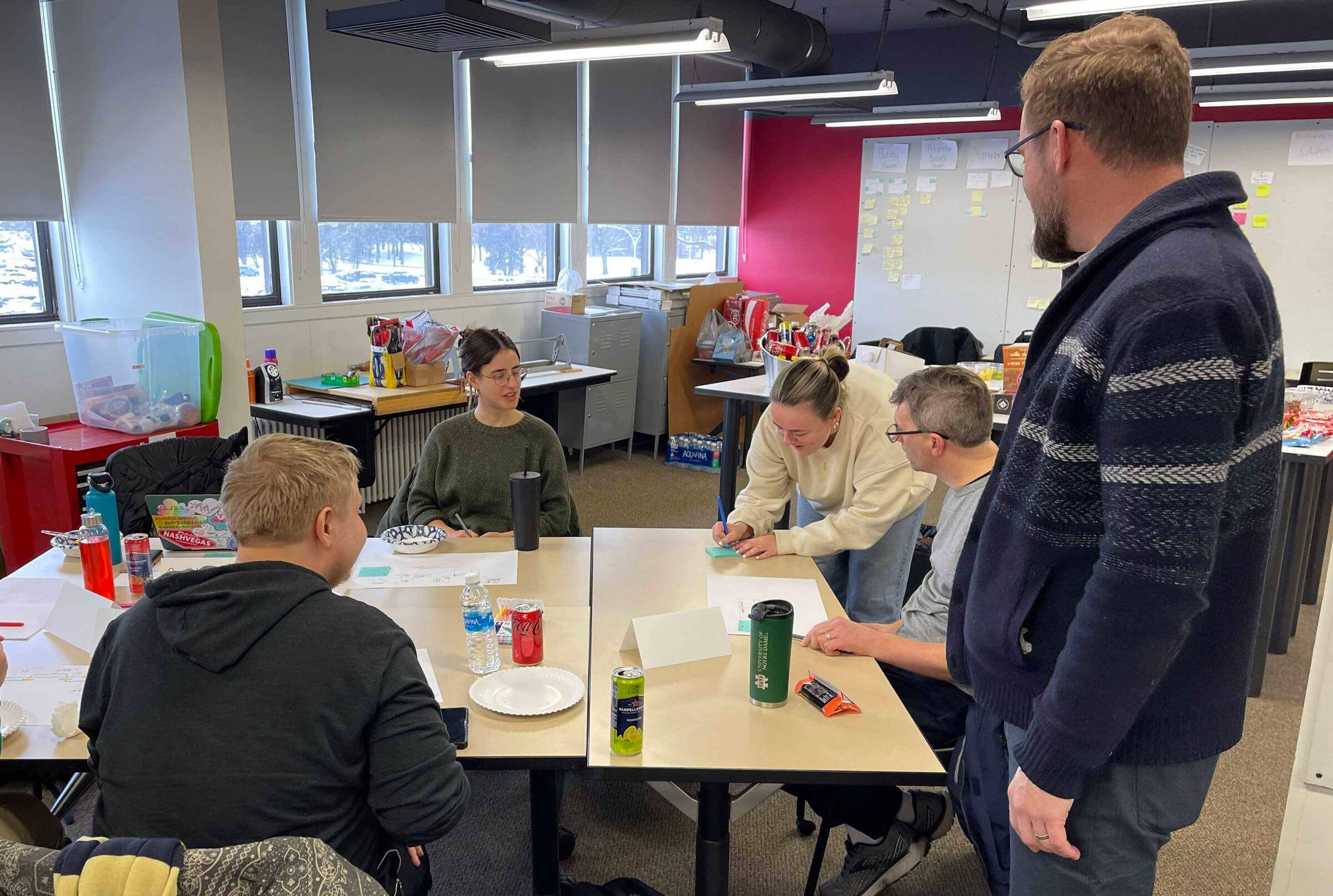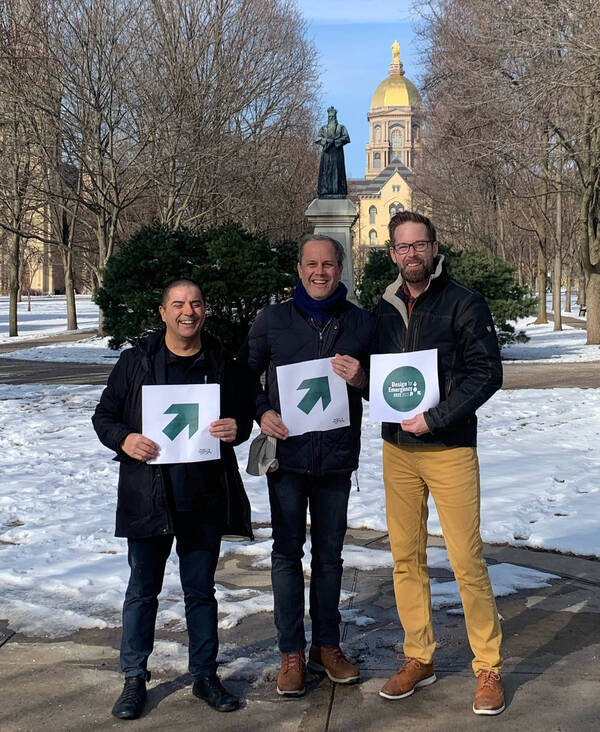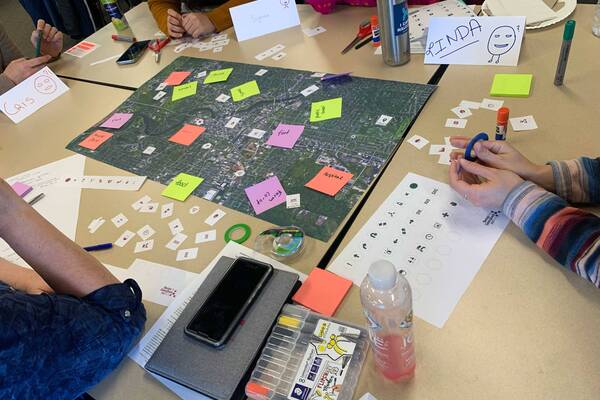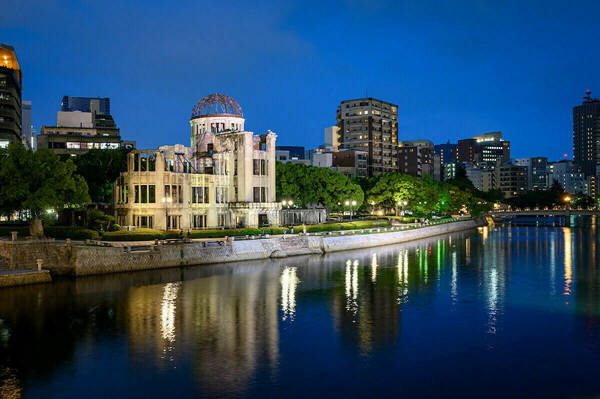Design for emergency: Notre Dame professor partners with international team to explore how to help communities prepare for disasters

In the face of climate change, a global pandemic, social inequity and unforeseen conflict, more and more areas of the world are confronting large-scale emergencies and natural disasters — often of a kind or at a magnitude they’ve never seen before.
Clinton Carlson, an associate professor of visual communication design at the University of Notre Dame, is exploring how design can help communities better prepare and respond when disaster strikes.
“I think it’s safe to say that going forward, we will all face different emergencies than we’ve ever faced before in our communities — and we can’t know what those disasters will look like,” Carlson said. “With climate change and other factors really disrupting our expectations of what can happen in an environment, it is really important that we not only improve our response to the emergencies that exist today, but also prepare for new challenges.”
With funding from a Luksic Family Collaboration Grant, through Notre Dame International, Carlson launched an initiative called Design for Emergency, which hosted a series of workshops on campus over the last two weeks.
One of the strengths of design thinking, Carlson said, is that it encourages people to take a holistic approach to a particular issue.
“I love the idea that one of our strengths in design is our lack of knowledge — we recognize that we don’t know everything about a problem we’re approaching, and we’re not too close to it to miss seeing opportunities,” he said. “And that’s a great benefit because we can observe and see patterns and new angles that maybe the people who are in the midst of it don’t always see or have time to think about.”

In partnership with professors from the Pontifical Catholic University of Chile and Pontifical Catholic University of São Paulo, Brazil, Carlson began the project in December with a series of roundtable discussions with experts who focus on wayfinding in disaster planning and fostering resilience in tsunami evacuation. The team then hosted four workshops on campus recently — two at the end of January and two on Friday and Saturday.
The first two workshops, one for Notre Dame undergraduates and one open to the public, explored issues related to food security in a crisis — including how to prevent the hoarding of staples like milk, eggs and toilet paper and the subsequent supply chain issues that ensue.
In the first public workshop, Carlson asked participants to consider what type of messaging would be most effective, who should be sending those messages and where they should be encountered. Before leading participants in a series of brainstorming activities, Carlson emphasized the value of a diversity of perspectives.
“As you come to this workshop today, we’re not asking you to be experts in emergencies or in food security,” he said. “We’re asking you to be experts in your own perspective — in how you see the world, your experiences and ideas, and how you make decisions. Because the more perspectives we have as we think about this issue, the better off we will be.”
The second set of workshops centered on emergency response and collaboration among organizations within a community. Attendees worked through scenario-based exercises to examine how organizations on the ground after an emergency can work together more efficiently.
“When you’re dealing with those complex networks, there are thousands of ways that everything can go wrong. If you go in with an expert mentality that ‘we can fix this, and we’ll find that silver bullet that will just work’ — well, those don’t exist. You have to be ready to adapt, to be agile and iterative in what you’re doing. And that’s something design does really well.”
— Clinton Carlson
The researchers plan to conduct a similar series of workshops this summer in Santiago, in collaboration with CIGIDEN, a Chilean research center. They also plan to begin working with and researching international response agencies like the Red Cross, World Vision and Mennonite Disaster Service that are on the ground within days of an emergency.

“We would like to learn more about their experiences, particularly when there are multiple agencies with often multinational, multilingual teams responding to see if there is the potential to develop products that could help them communicate and coordinate,” Carlson said. “Our end goal is to develop a toolkit that can be used by communities and organizations that want to plan for unforeseen emergencies — whether that’s a rural community in Chile that might be facing tsunamis or earthquakes or a community like South Bend that might face entirely different concerns.”
Because design is an interdisciplinary field that is integrated with technology, science and social science research, it’s well suited to the kind collaboration necessary to take on what Carlson terms “wicked problems,” he said.
“We are able to work in those spaces where there’s a complexity to the network of technology, people and organizations,” Carlson said. “We are also not afraid of failure and, in fact, one of our objectives is to find out how things can fail. When you’re dealing with those complex networks, there are thousands of ways that everything can go wrong. If you go in with an expert mentality that ‘we can fix this, and we’ll find that silver bullet that will just work’ — well, those don’t exist.
“You have to be ready to adapt, to be agile and iterative in what you’re doing. And that’s something design does really well.”
Latest International
- Statement from University President Rev. Robert A. Dowd, C.S.C., on the anniversary of the atomic bombing of HiroshimaToday, on the anniversary of the bombing of Hiroshima, Father Dowd offered remarks at the Elisabeth University of Music as a guest of its president, Yuji Kawano, and Bishop Alexis Mitsuru Shirahama of Hiroshima. Father Dowd focused on the role that universities can play in addressing the current nuclear predicament and the wider challenges of peace in today’s world.
- Vatican honors Martin and Carmel Naughton with papal awardThe late Pope Francis, in one of his last acts, conferred the honour of the Order of Saint Gregory the Great upon Carmel and Martin Naughton, Trustee Emeritus of the University of Notre Dame. The papal honor is in recognition of the Naughtons’ outstanding philanthropy in the areas of education and the arts, particularly in the provision of philanthropic support and scholarships to Catholic education at the University of Notre Dame and Kylemore Abbey, and in their transformative contributions to higher education in Ireland.
- Prioritizing prenatal care may decrease low birth weight outcomes in The Gambia, Notre Dame research findsA new study co-authored by University of Notre Dame researchers highlights the importance of prenatal care for improving the health of mothers and newborns, providing evidence that can inform policy.
- Navigating the waters of peace: Researchers address challenges, opportunities in implementation of Colombia's Peace AgreementNearly half of the commitments outlined in Colombia's historic peace accord face significant challenges and may not happen in time unless policymakers make several key interventions, warns a new report from Notre Dame's Peace Accords Matrix. The report offers a blueprint to salvage an accord that has lagged behind its implementation deadlines, putting its legacy at risk. It highlights timely fixes that can strengthen the agreement.
- Partial peace deals may facilitate comprehensive accords, offering roadmap for policymakers, practitionersPartial peace agreements — deals that address targeted issues on the way to larger comprehensive accords — could provide a blueprint for peacebuilding policymakers and practitioners, according to new University of Notre Dame research.
- CANCELED: University to host Cardinal Pedro Barreto of Peru and Cardinal Peter Turkson of Ghana as part of Notre Dame ForumAs part of the 2024-25 Notre Dame Forum, Cardinal Pedro Ricardo Barreto Jimeno, S.J., of Peru and Cardinal Peter Kodwo Appiah Turkson of Ghana will visit the University of Notre Dame to participate in a conversation with President Rev. Robert A. Dowd, C.S.C., at 11:30 a.m. April 25 in the Smith Ballroom of the Morris Inn. The conversation is open to the public and will also be livestreamed for both Spanish-speaking and English-speaking audiences.













